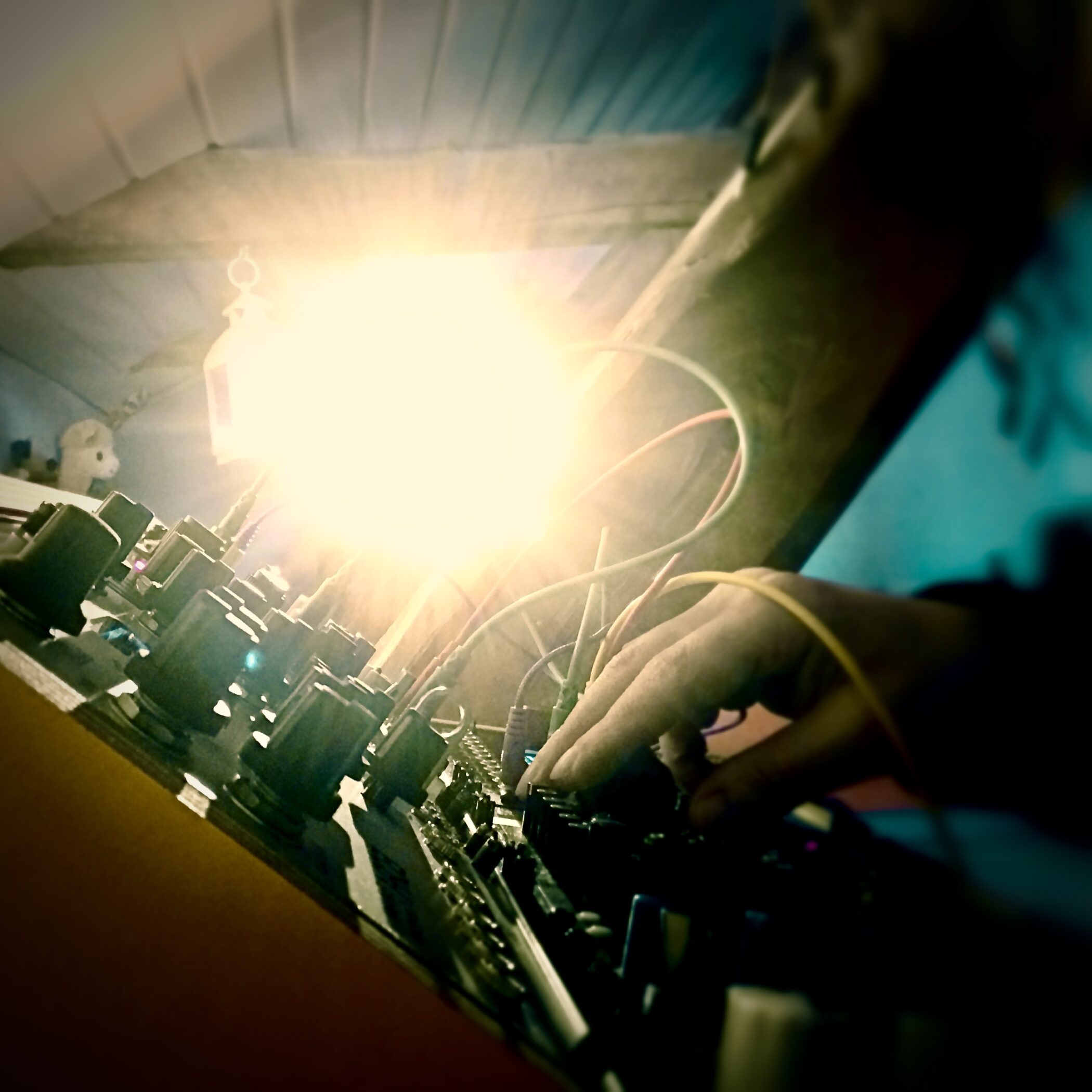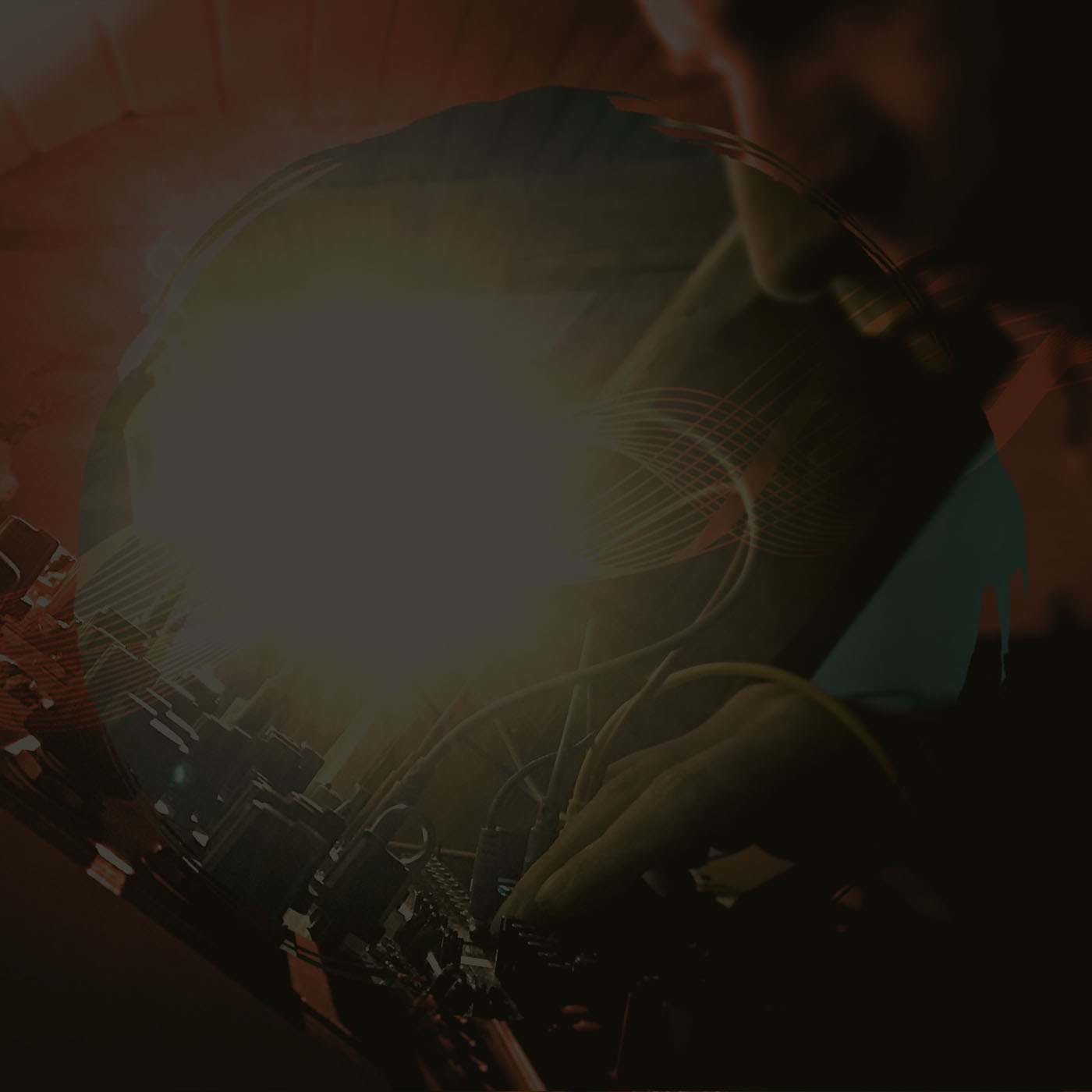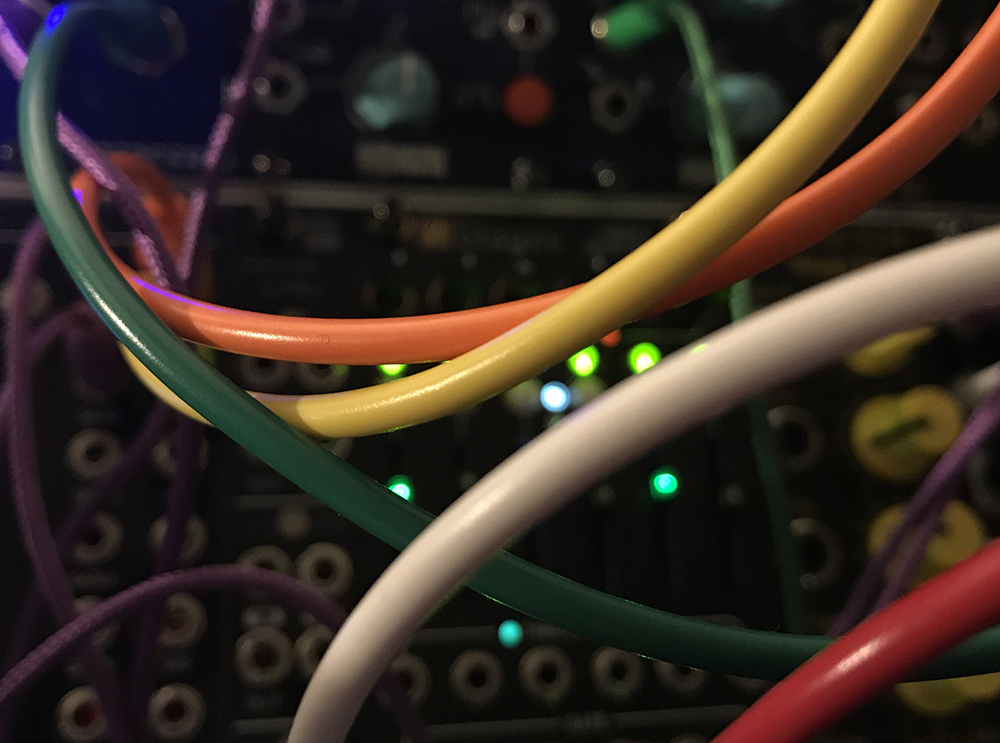
Michl Britsch (born in Frankfurt/Germany, now living in Turku/Finland) is a self-taught musician and has written music for several feature films in different genres.
What have you been working on lately, and do you have any upcoming releases or performances?
At the moment I am working on a concept for something I’m going to call ‘Permodular Culture’. It is an idea I was pondering about since I absolved my Permaculture Design Course a couple of years ago: how can I bring art and Permaculture together? Or how can the Permaculture Design Principles be used in music and arts in general, to learn more about them and internalize them.
The modular world is perfect to explain most of the principles as Permaculture is all about analyzing systems to make them better, sustainable and self-regulating. In the traditional sense this would be some kind of garden or agricultural project. But Permaculture goes further. It also has social and societal aspects. It can help to transform something that does not really work yet into something that does.
Some keywords are: diversity, self-organization, interconnectedness, flexibility, interplay, momentum, accepting feedback from system – things we are familiar with from working with modular systems.
How were you first acquainted to Modular Synthesis? When did that happen and what did you think of it at the time?
How does it marry with your other « compositional tricks »?
I never gave a lot of thought to modular synth to be honest. I listened to modular stuff, but I did not think a lot about the process itself and I didn’t know too many people who had a system. Just one of my friends had a huge system, like a whole wall full of cases, hundreds of modules. I remember I was more appalled than fascinated at the time. I am used to work with very limited equipment. The sight of this modular monster was was a bit off-putting. I swore to myself I will never get into modular. The whole thing had an addictive vibe to it. Like a massive record collection or something. And here we are, a couple of years later and right now my modular system is the basis of most my music.
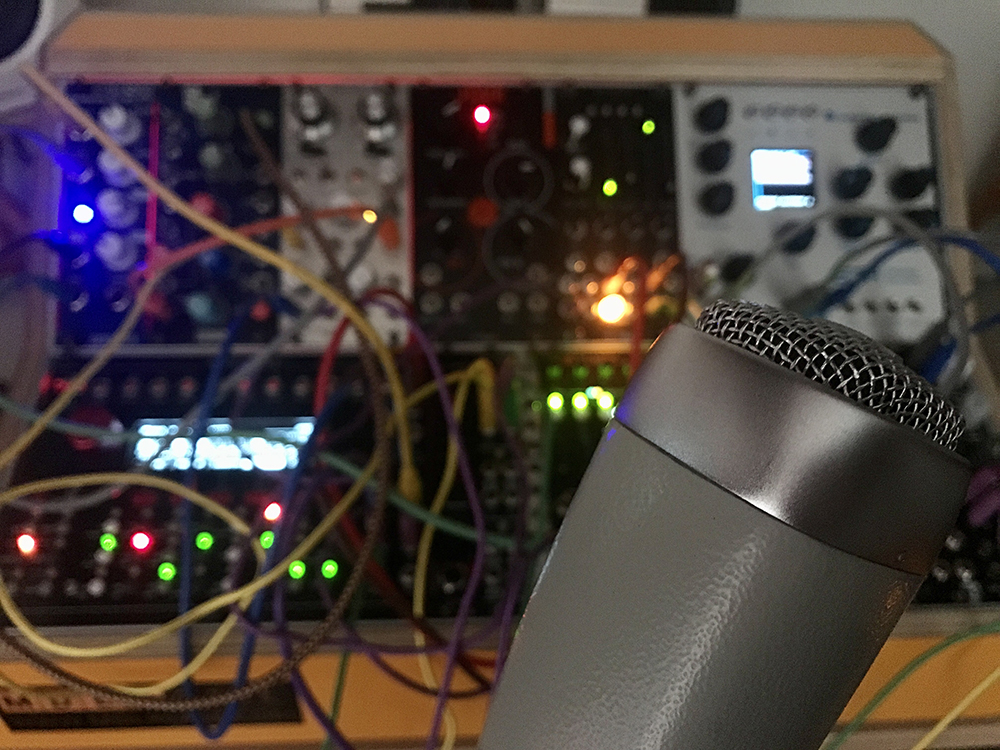
When did you buy your first system?
What was your first module or system?
How long did it take for you to become accustomed to patching your own synthesizer together out of its component parts?
I actually bought my first system pretty much a year ago. It all started with a synth which had a couple of CV inputs and I had some patch cables lying around and I was wondering what I could do with those. So I began to research and found that there are all kinds of small cases out there and that I would not need one of these huge boxes to build a modular system. That was intriguing to me. When I saw the first 3U/84HP case I thought “Hmm, I think I could handle this!”. In the end it became a 6U/84HP case, the kind of dimensions I like to work with and have in my room. I do not have a big studio. My equipment is always where I live. I live with my instruments so to say, so I really have to like them and want to have them around me. And 2020 seemed like a good point to start exploring and learning something new, make a new beginning. Once I had the first modules in my hands I started recording and working on small albums with them immediately. I fell in love very quickly, when I saw the possibilities and the effect this technique could have on my creative process.
What was the effect of that discovery on your compositional process?
On your existence?
I like the immediacy and the interaction you can establish with a modular system. It was like a blow of fresh air to me. I got stuck a bit with how I was creating and thinking about music for a while. At the moment everything I do starts with the modular, like I mentioned before. From nowhere else can I get this creative innocence, an almost punk-ish innocence at times. Everything goes! This is why I never keep my modular system patched-up.
When I made a recording that pleases me I immediately un-patch everything.
The modular also brought so called ‘mistakes’ back into the game for me, which got rare working with a DAW. And the appreciation of the moment which created that ‘mistake’. Often while I am performing and recording there is that moment when I think ‘Oops, just messed that one up!’ but when I am playing back the recording and listen to the take it often becomes my favorite moment of the recording.Taking advantage of those ‘accidents’ and learn to detach myself from preconceived outcomes is another thing. Modular can get me pretty close to what the buddhists call ‘the beginner’s mind’. Being open and avid with no preconceptions. I always try to start on a more or less blank page and be open about everything that might happen. One of the Permaculture principles suggests to creatively use and respond to change. That’s one of the big lessons I can learn with modular systems, I guess.

Quite often modularists are in need for more, their hunger for new modules is never satisfied? How do you explain that?
That was actually exactly the part which I found a bit off-putting at my first encounter and which kept me from getting into modular systems for many years. This collector’s mindset. It is quite the opposite of being creative, it’s pure consumerism. It feels like I am doing something when I am looking for new modules, when I am actually just browsing and dreaming away and could be working with what I already got right here in front of me.
So for me personally it is almost the other way around:
most of the time I am thinking which module can I let go next? This is the better practice for me somehow.
Another thing I recommend is trading modules. You can save some bucks and rack space and get in touch with people which again creates space for some nice surprises.
Instrument building may actually be quite compositional, defining your sonic palette, each new module enriching your vocabulary. Would you say that their choice and the way you build your systems can be an integral part of your compositional process? Or is this the other way round and you go after a new module because you want to be able to sound-design some of your ideas?
Do you prefer single-maker systems (for example, Buchla, Make Noise, Erica Synths, Roland, etc) or making your own modular synthesizer out of individual components form whatever manufacturer that match your needs.
I don’t think it’s an ‘or’. Both principles are at work most of the time and not mutually exclusive.
I am not fixated on a single-maker. My system is a mix of different brands which I find the strength of Eurorack. Take the best of all worlds and create your own. Another Permaculture principle can be applied here: use and value diversity.
How has your system been evolving?
It evolved from a pure modulation source to something which I can use as a full instrument… or as many different instruments just by rearranging it. A modular system is a sound chameleon with a long and sticky tongue.
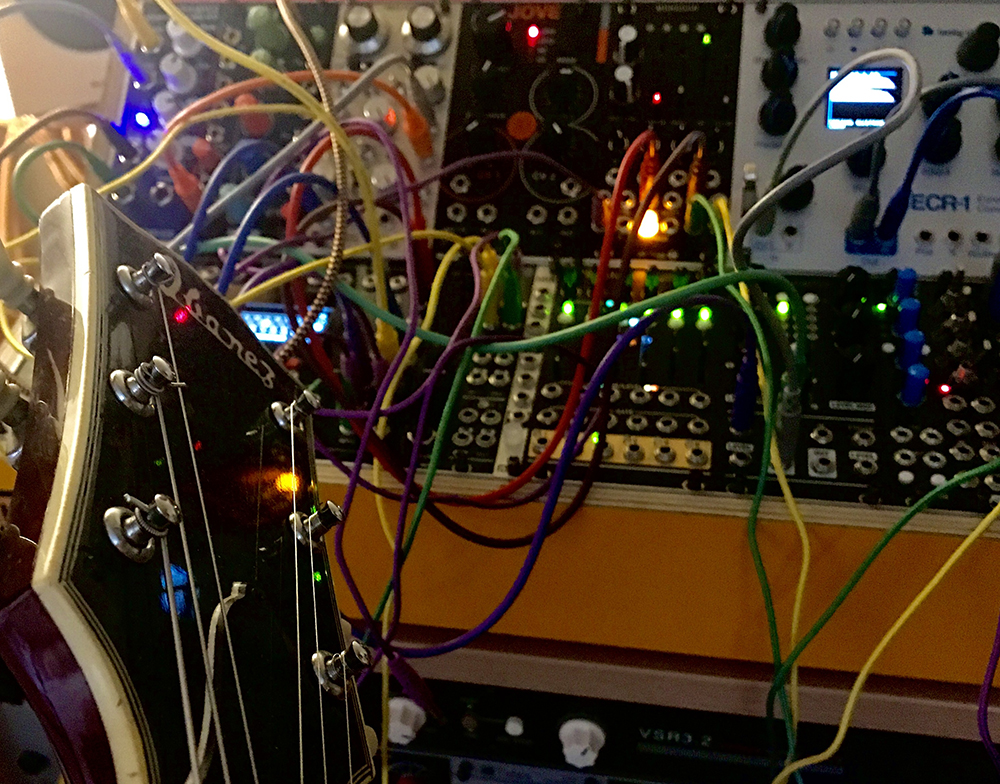
Do you tend to use pure modular systems, or do you bring in outside effect and devices when playing or recording?
I always try to mix things up a little, so I definitely bring in non-modular stuff when I feel for it. Isn’t that the whole idea of ‘modular’? Interconnectedness. Anything can be modular, anything can be connected. Namely I like to play my guitar through the system or hook up a microphone. I also have a module which creates a Send/Return for my guitar pedals, which is very handy. There are many ways to expand. I am not a purist in any way.
Would you please describe the system you used to create the music for us?
Can you outline how you patched and performed your Modulisme session?
I did everything within my 6U/84HP case, guitar, mic and a gong (on one track). The heart is the Westlicht Performer, which is a very powerful sequencer, and my three oscillators: Doepfer A-110-4 QZVCO, IO Instruments Themisto and XR22 VCO by CG-products. I like to patch back and forth between those three VCOs and let them communicate with each other in all kinds combinations (best heard in the middle part of track 7, which is just those three with a fader controlling the 1V/Oct CV-inputs simultaneously, dialing in different tunings on the fly). Minute changes can have big effects, because they affect the sound of all three at the same time. I call that crisscross-modulation, haha. Other tracks are based on playing guitar or singing directly into the Monsoon, sequencing and modulating that and patching on from there. Every track was recorded in one stereo take into my Tascam DR-40 recorder. I usually record two to three performances, learning what I can do with the patch and then pick the one I like best. After that I keep the selected recordings on my Tascam for a while and listen back every now to find out which tracks keep talking to me.
I took the liberty to put the session together in Logic and use some crossfading for some parts to create the whole journey. I wanted to apply some kind of aural storytelling to my session, an arc that you can follow while listening. But I am not giving away any details here. I had my story while working on the tracks and the listener should have their own based on their listening experience. It’s a dialogue, you listen and respond to it in your way, create your own pictures. I am not taking that away from you. I gave myself 8 days to record the parts for the session to keep it homogeneous and diverse enough at the same time. I wanted to make sure it is the same stream of consciousness, but still include many different facets. Plus I like to listen to albums, so it has a distinguishable A and B-side.
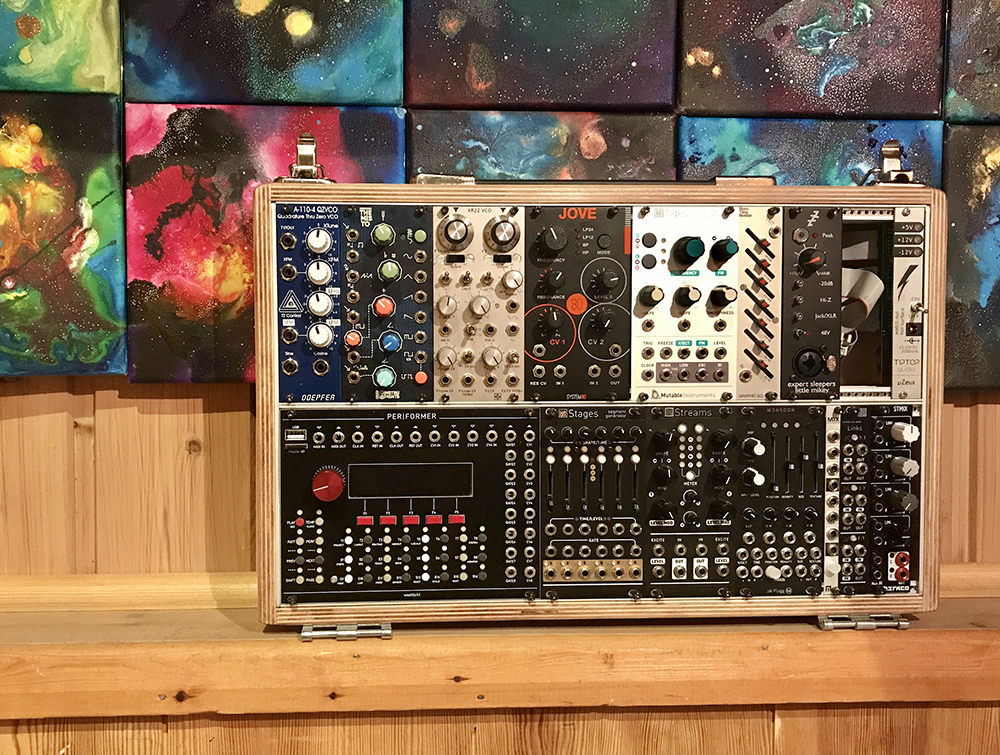
What do you think that can only be achieved by modular synthesis that other forms of electronic music cannot or makes harder to do?
The immediacy, the interaction, the way you can communicate with your system. It feels like a living thing. Using modular and CV it becomes very clear (much clearer than with other electronic instruments) that you are dealing with a life force here, with energy in the most literal sense. You are transforming that energy into sound. I never had that feeling with other synthesizers before, but it hit me when I started working with the modular. It’s almost organic, like a living entity. The fact that one uses cables to make the connections… like a nervous system of sorts! It is a certain sound that modular can give you and I think ‘organic’ is the best way to describe it. Also the way of improvising is very different. Improvising with the modular develops into a kind of real time composition which is hard to achieve with other hardware. You always have to break the flow at a some point by pressing this or that button. With modular you plug or pull a cable and the performance is still intact. Again a Permaculture principle comes to mind here: Observe and interact, which is pretty easy to accomplish with a modular system.
What would be the system you are dreaming of?
I do not dream of systems as such. I work with what I got. I don’t need a system to create music. If this form of society goes to shit you will find me in the forest by a camp fire, drumming with sticks and stones, howling and whistling. Technology is nice, but it is not what makes people want to express themselves in sound. That goes much deeper…
Are you feeling close to some other contemporary Modularists?
Which ones?
Which pioneers in Modularism influenced you and why?
A lot of contemporaries I found via modulisme, Shiro Fujioka and Bana Haffar stand out. I am always looking for some poetry in the sounds and I think Shiro and Bana bring this into the modular world. They rhyme experimental with melodic with disharmonic with rhythm. I like eclectic jams. I listen to their sessions a lot. For me they work like perfect albums. I also like the session by Timothy Lewis a lot, which I discovered here on Modulisme recently. Modulisme is a treasure trove for me.
The only modular pioneer I can really think of as an influence is Morton Subotnick. I was listening to his recordings a long time already before I got into modular. I just enjoyed his tones and timbres, his sense of rhythm and dynamics and his playfulness and sound poetry (‘Sidewinder’ comes to mind). There is this arc I can follow. It doesn’t always have to be verbalized, but it is there. I can feel it.
But there is a bunch of other artists of whom I feel that their mind set is kind of modular and for that reason would consider as influences on my work: Cluster, Roedelius (especially his Selbstportrait series), Faust, Neu! or even Terry Riley at points. And I wish Frank Zappa would have recorded a pure modular album, damn! That would have been awesome… ‘Modular from hell’.
Any advice you could share for those willing to start or develop their “Modulisme” ?
Keep it simple.
https://www.imdb.com/name/nm0110042/
